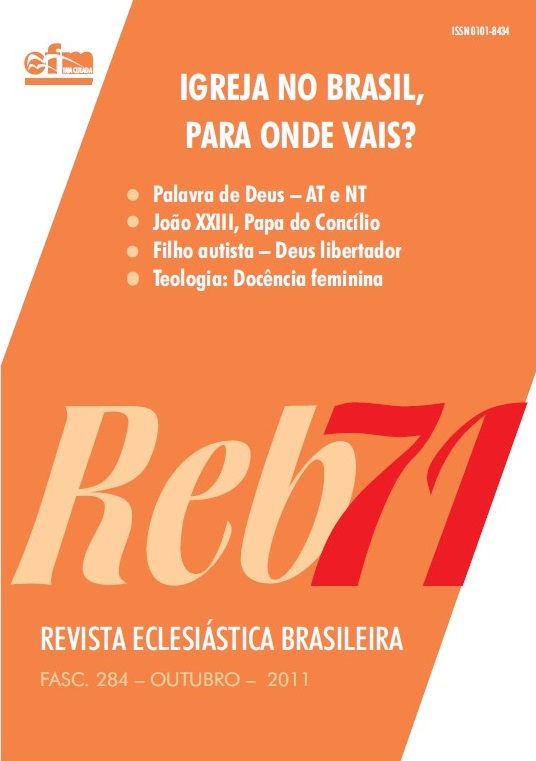João XXIII, o papa do Concílio. “Veio um homem enviado por Deus cujo nome era João”
DOI:
https://doi.org/10.29386/reb.v71i284.961Palabras clave:
João XXIII, Vaticano II.Resumen
Às vésperas dos 50 anos da inauguração do Vaticano II e baseado nas fontes hoje disponíveis, o Autor traça em cores vivas um quadro da relação entre João XXIII e o Concílio. Relação marcante, apesar da morte do Papa após a primeira sessão conciliar, uma vez que, imaginado, anunciado e inaugurado, o Vaticano II recebeu dele o impulso em favor do ecumenismo e do aggiornamento, da busca às fontes da Boa Nova e de sua tradução para os dias de hoje, na firme confiança de que o Espírito Santo assistiria a Igreja. Portanto, delinear a determinante influência de João XXIII sobre o Concílio, possibilitando, assim, a admiração por sua pessoa e obra, é a contribuição que o Autor deseja apresentar.
Abstract: On the eve of the 50th anniversary of the inauguration of the Vatican II Council and on the basis of the sources that are now available, the Author draws in vivid colours a picture of the relationship between Pope John XXIII and the Council. This was a remarkable relationship in spite of the Pope’s death just after the first session of the Council, since once imagined, announced and inaugurated, the Vatican II received from John XXIII the impetus in favour of ecumenism and aggiornamento, of the sources of the Good Tidings and of their translation for current times, in the absolute trust that the Holy Spirit would assist the Church. Thus, the contribution the Author wishes to present here is an outline of the huge influence John XXIII had on the Council – something that will contribute to increase our admiration for his personal qualities and for his work.
Descargas
Descargas
Publicado
Cómo citar
Número
Sección
Licencia
Derechos de autor 2019 Revista Eclesiástica Brasileira

Esta obra está bajo una licencia internacional Creative Commons Atribución 4.0.
Os autores cedem os direitos autorais; como gratificação, a REB oferece dois exemplares ao Autor de um artigo.
A REB adere à licença não comercial (Creative Commons). Portanto, é permitida cópia, distribuição e exibição dos textos, respeitados os direitos autorais e citada a fonte de sua proveniência.


